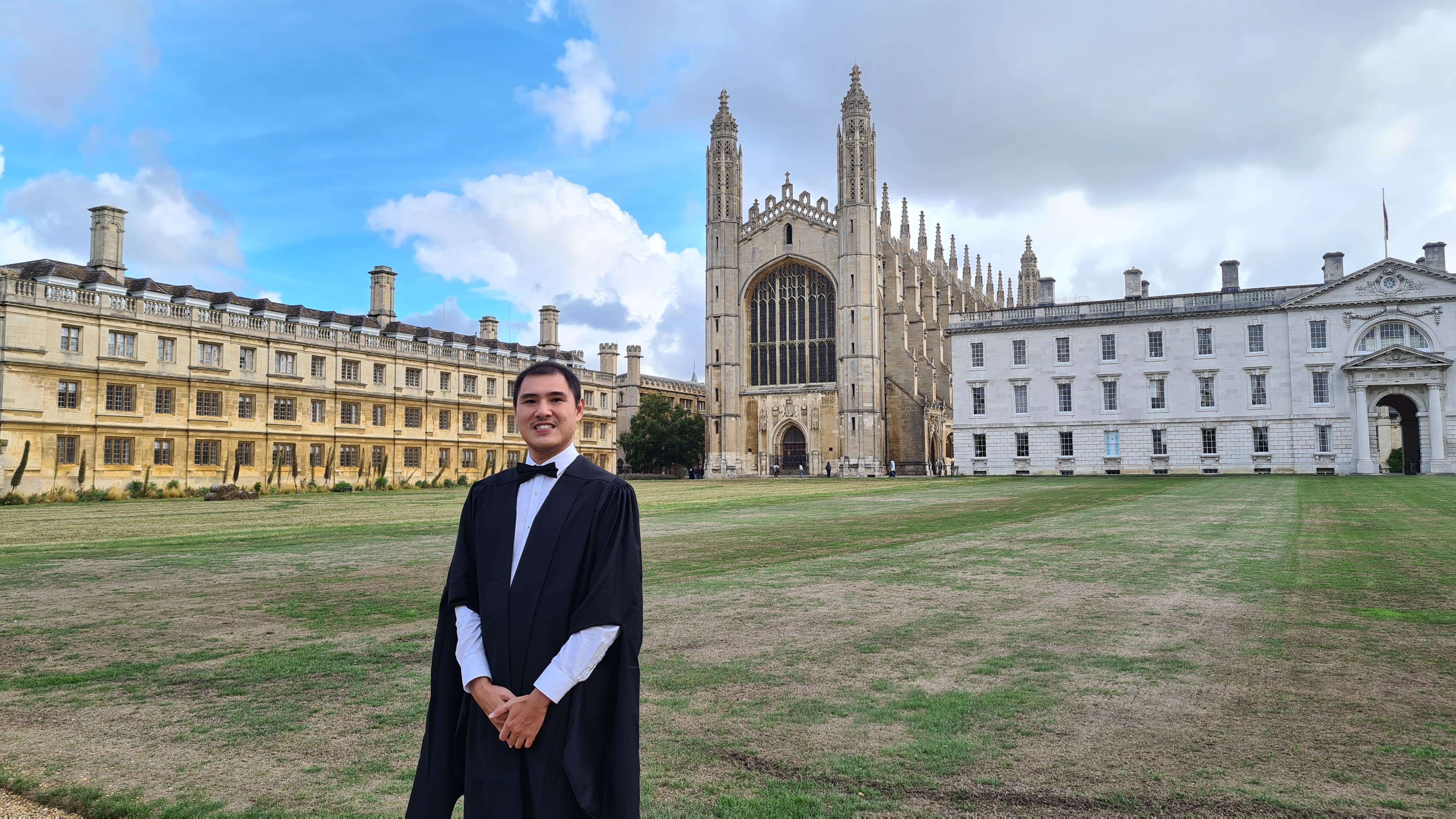Secure a Scholarship: 5 Insider Tips from a Scholarship Winner
Leo Nyein Zaw Ko is a graduate student at the University of Cambridge and a multi-scholarship winner. Here, he shares some of his top tips for applying for and winning scholarships.

Leo Nyein Zaw Ko is an environmental activist from Myanmar who advocates for the increased protection of endangered Irrawaddy dolphins. He was a finalist the 2022 Study a Master’s in Europe Scholarship offered by our sister-company, educations.com.
Leo is a serial scholarship winner in three different countries. His undergraduate degree in Biomedical Engineering and Management was funded by the Emily Scholarship at Bucknell University in Lewisburg, Pennsylvania. After finishing his bachelor’s, Leo completed a master’s degree in environmental management at the National University of Singapore funded by the Shell-MEM scholarship. He is currently pursuing a fully funded Master of Philosophy in Conservation Leadership at Selwyn College at the University of Cambridge.
Below, Leo shares some of his tips and experiences applying for scholarships. You can learn more about Leo’s story and his advice for scholarship applications by watching Leo's webinar below.
1. Plan Diligently and Apply Early
However simple and intuitive it sounds, one can never sufficiently underscore that the early bird catches the worm. The number one way to win a scholarship is to plan ahead and apply early.
Most students aim to apply to at least five universities. If you add in scholarship applications – both for the universities and outside funding, like the Fulbright or Chevening scholarships - a student applying for five courses might actually need to complete 15-20 applications.
This process is particularly challenging for graduate students who might need to balance this with family, work, and other commitments. Despite this, it is surprising how many students drag their feet and procrastinate until the last minute to start their applications or write their personal statements. This is a mistake.
I learned this the hard way. Last year, I was applying to Oxford, Cambridge, Ivy Leagues, Chevening, Jardine, and others and, in some instances, I simply couldn't finish some applications on time. To make matters worse, some popular scholarships, such as Chevening and Fulbright application portals, tend to crash on the deadline day due to excessive traffic. And one becomes very prone to computer issues and missing documents when doing things in a rush. Doing things at the last minute is definitely a losing strategy.
The number one reason people miss out on scholarships isn’t because they are not qualified. It’s because they don’t even get to apply in the first place. They don’t plan their work ahead, or they procrastinate so much that they miss the deadline, forget essential documents, or get held up by technical issues.
Never underestimate the amount of work involved and make sure to plan accordingly. University applications and scholarships usually run in one-year cycles, and one needs a viable work plan to catch all the deadlines without fail.
2. Start your personal statement off right
"Ask not what your country can do for you--ask what you can do for your country." Many people might think that JFK's famous quote is a very impressive way to start your great masterpiece of a personal statement. They think that famous quotes make very good starting points because the readers are - more often than not - already familiar with them and you can introduce your context succinctly by conjuring up mental connections with the wider circumstances surrounding those famous quotes. Applicants assume that famous quotes create an impression that they have read a lot and sound academic. They think quotes are helpful in building a narrative arc or introducing an element of suspense to hook the readers. Famous quotes may look like the best way to start your personal statement except that they are NOT.
Let me repeat. Famous quotes are inspiring but they are also a surefire way of getting your application overlooked or even rejected. Why? Because a personal statement is supposed to be that - YOUR personal statement, not JFK’s presidential address. Most personal statement briefs come with a very strict word limit. A famous quote in the first sentence can indicate a serious lack of imagination in an applicant. Worse, it can be a sign that the essay writer can’t even find enough words of their own to explain why they are deserving of a scholarship.
Here, I want to emphasize that I do not dissuade the use of quotes entirely in your essay, but they should not be used as an opening statement or first line. Famous quotes are indeed very powerful literary tools and there are circumstances where they can apply a master stroke. But the problem is that starting with them could lead to bad impression and an undesirable outcome even though it seems like a great way to do it for inexperienced beginners.
Thus, never start your personal statement with a famous quote. If possible, refrain from using them as much as possible. If you can’t resist the urge, perhaps you should use it at the end, but not at the beginning.
3. Make extracurriculars matter
Extracurricular activity is probably the most ambiguous part of any scholarship applications. In fact, the most significant thing about volunteering is an obvious lack of concrete guidance on what you should do, how long you should do, and how much volunteering you should do. But when one puts oneself in the shoes of an admission officer, some trends become self-evident.
In my opinion, the reason admission officers want to see extracurricular activity is because they don't just want to read your future aspirations. They want to see what you can do on the ground to back up your words in your personal statement. That's why leaders who started their own initiative always seem to win scholarships and followers who signed up for some volunteering following their friends’ advice never ever win anything.
The most important catch here is that just achieving something is not sufficient. One needs to measure the achievement and put it into perspective to showcase the scale of the achievement relative to other applicants. Benchmarking with someone else is a very effective tactic to make a convincing case. Hence, choosing the right benchmark is imperative and there is a lot of room for creativity and imagination.
In the 7 Habits of Highly Effective People, Steven Convey’s second habit is "Start with an end in mind". Thus, imagine beforehand what kind of achievement you want at the end and strive for it until you achieve it. Scholarship committees are looking for applicants who can lead the way – whether through actual leadership or through innovation and creativity.
4. Pick the right reference
A reference letter is something that can be the most challenging aspect of an application because the applicant has the least control over it. However, there are still some elements that an applicant can still control. One might wonder what the most important thing in a recommendation letter is. Many students are concerned with what would be written about them, whether that be mostly positive or negative or somewhere in between, or will the referee include all the important information without fail.
In my opinion, the most important thing is not what is written in it, but rather who writes it. The recommendation is all about testing how good you are at networking and if you can get close to an appropriate person and convince this person to write a letter of support for you, you stand a good chance of getting selected. The saying "In life, who you know matters more than what you know” rings true in recommendation letters. So, choose your referee wisely.
5. Sell yourself in interviews
The interview process is the most daunting aspect of any university or scholarship application. It is usually the last and most difficult stage.
The biggest problem with scholarship interviews is that a lot of students think they are the same as a job interview. There is a huge difference between a job interview and a scholarship interview.
Job interviews are about reminiscing about the past. An applicant needs to reflect the past, relate the past to the present role, and showcase previous work experiences and skills to qualify for the role. Scholarship interviews, on the other hand, are about selling your future. The interviewers are interested in what an applicant could potentially achieve in five, ten, or even twenty years’ time and judge whether the applicant deserves their investment. In a way, a scholarship interview is more akin to a business pitch in which an applicant pitches about a long-term project with a clear vision to gain some investment.
This is the most challenging part because people explaining the past can be straightforward, whereas describing a potential future takes skill. Many students do not fully understand their own potential and what kind of doors international education will open for them. Career planning is a critical skill for every professional and nobody can realistically hope to gain admission or win a scholarship without some concrete ideas of what their future will be like in five to ten years’ time.
So, the biggest mistake an applicant could make is stating their grades and advocating that he/she deserves the scholarship because of that high academic achievement. That would only be successful in prompting the interviewer to automatically think about a competing candidate with a better grade than the applicant, and that the other candidate deserves the place per your suggestion. So, never bring up your past unless your interviewer specifically asks you to do so. Even then, always ends with some implications for the future.
Bonus: Watch Leo's Webinar!
In this webinar, Leo outlines the steps to applying for scholarships, offers his experiences and insights, and answers questions from international students from around the world.

Guest: Leo Nyein Zaw Ko
Author
Leo is an environmental activist from Myanmar studying Conservation Leadership at the University of Cambridge. He shares his tips and experiences applying for, and winning, scholarships with international students around the world.